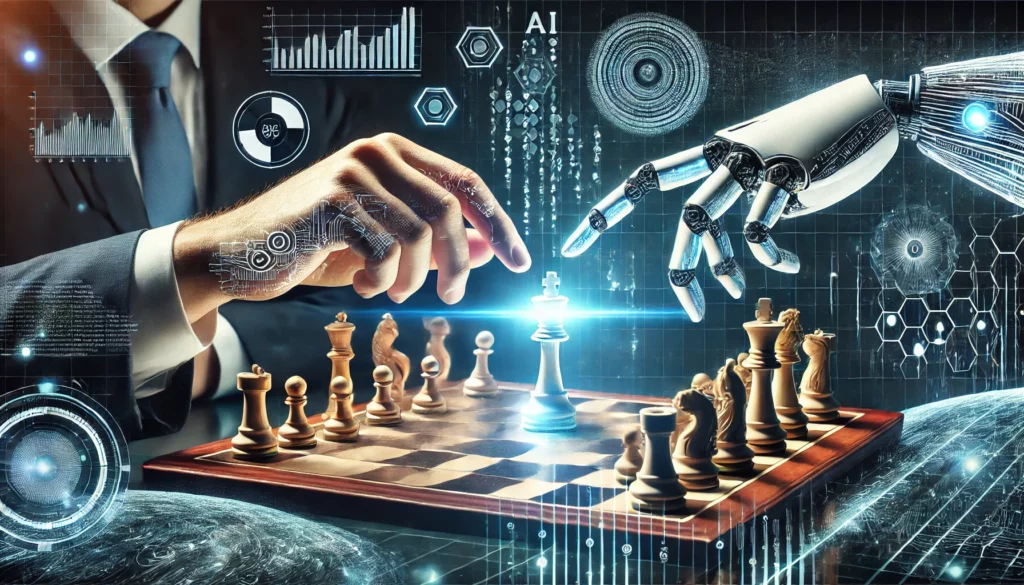
#AILeadership #FutureOfWork #AIvsHumans #TechInnovation #BusinessStrategy
Imagine an AI sitting in the CEO’s chair, making faster, data-driven decisions. Sounds like science fiction? Think again. 🌐
In a recent simulation, AI didn’t just compete—it outperformed human CEOs in key metrics like market share and profitability. But here’s the twist: while AI shines in data-crunching and short-term decisions, it struggles when faced with unpredictable events. 🤖💥
So, what does this mean for the future of leadership? Let’s dive into the details.
1. AI Dominates Data-Driven Decisions
In industries like automotive, AI models have shown the power to analyze massive data sets and iterate on product design and market optimization with remarkable speed. In the simulation, AI models consistently beat their human counterparts in terms of profitability and market share.
📊 Key fact: A 2023 McKinsey study reports that 50% of Fortune 500 companies are already leveraging AI for strategic decision-making, with some seeing up to 40% productivity gains. 🚀
AI is invaluable when it comes to short-term decisions that require complex data analysis. This has massive implications for sectors where speed and accuracy can provide a competitive edge—finance, logistics, retail, and more.
2. The Black Swan Problem
Here’s where AI hits a wall: when the market turns chaotic or unpredictable. While AI can simulate thousands of scenarios, it lacks the intuition and human foresight to navigate through black swan events—those rare, disruptive occurrences that can’t be easily forecasted with historical data. 🦢
Take the pandemic as an example. Human leaders rapidly restructured supply chains, pivoted to new business models, and made ethical decisions to safeguard employees. AI, however, struggled to adapt when confronted with such unprecedented scenarios.
❗ Real-world example: During the COVID-19 crisis, companies using AI-driven logistics saw initial success in efficiency, but when global supply chains collapsed, it was human intervention that saved many from catastrophic losses.
3. The Future of Leadership: AI-Augmented CEOs
The future isn’t about AI replacing human CEOs—it’s about augmenting leadership with AI tools.
AI will help human CEOs by:
- Accelerating data analysis and forecasting trends
- Optimizing daily operations and decision-making
- Freeing up time for leaders to focus on vision, creativity, and long-term strategy.
But humans will still be essential for:
- Making decisions in uncertain and ambiguous situations
- Navigating ethical dilemmas
- Setting the long-term vision that requires creativity and innovation.
🤝 Example: In 2023, JP Morgan used AI to improve trading efficiency by 15%, but when geopolitical tensions caused market fluctuations, human intervention was necessary to make nuanced decisions that AI couldn’t handle. 🌍
4. The Ethical Dilemma
AI can handle numbers, but it can’t navigate the moral grey zones. For companies in industries like healthcare, energy, or technology, ethics often play a critical role in decision-making. Should we pursue a project if it maximizes profit but harms the environment? AI doesn’t know how to weigh those kinds of questions—it lacks empathy and moral judgment.
Key question:
- Can AI be trusted to make ethical decisions? For now, the answer is no. Human leaders will remain indispensable in steering corporate culture, maintaining ethical standards, and making decisions that align with human values.
5. Real-World Integration of AI and CEOs
Imagine a boardroom in 2030:
- AI presents instant insights from global market data, competitor analysis, and operational inefficiencies.
- The human CEO interprets these insights and combines them with experience, cultural knowledge, and human intuition to make final decisions. This hybrid approach allows for faster, more accurate decisions, without losing the empathy, ethics, and creativity that make human leadership irreplaceable. 🚢
What Does This Mean for the Future?
AI is here to stay—and it’s reshaping leadership. The CEOs of tomorrow will use AI not just as a tool but as a partner, freeing them up to focus on complex, unpredictable challenges that AI simply can’t handle.
But make no mistake: the CEOs who leverage AI effectively will outperform those who don’t. The future of leadership is human intelligence enhanced by artificial intelligence. 💡
Key Questions for the Future of Leadership
- How can future CEOs be trained to leverage AI while maintaining the human touch?
- Which industries will benefit most from AI-driven leadership?
- What’s the best way to integrate AI ethics into corporate governance?
💬 I’d love to hear your thoughts! Where do you see AI making the biggest impact in leadership over the next decade? Comment below, and let’s discuss the future of corporate strategy.
P.S. If this post got you thinking, feel free to share it ♻️ and let’s get more voices involved in this important conversation!